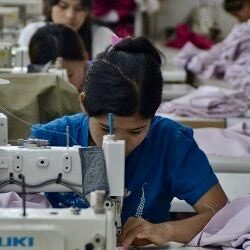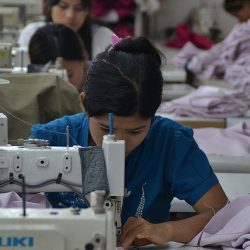‘‘Coronavirus crisis has heightened modern slavery risk’’

The risk of modern slavery has increased in certain sectors due to the coronavirus pandemic, according to Catherine McCabe, an analyst at the Canadian firm BMO Global Asset Management (BMO GAM). In an article in Dutch financial newspaper FD, she urges companies to actively investigate their supply chains for slavery in order to prevent financial and reputational damage.
On behalf of BMO GAM, McCabe analyses investments from a corporate social responsibility perspective. In the FD, she cites the example of a Malaysian company called Top Glove, a market-leading manufacturer of rubber gloves. The company experienced explosive growth in demand due to the coronavirus outbreak, which left it urgently needing at least a thousand new employees.
Malaysia is known as a country with a high risk of modern slavery. Migrants who want to work at Top Glove have sometimes been required to pay recruitment fees, for example, often leaving them in debt – and then the risk of abuse is not far behind, according to McCabe. There are also allegations of Top Glove employees being forced to work overtime, not always getting paid, and sometimes even having their passports confiscated to prevent them from leaving the country.
Complex supply chains
McCabe believes that suboptimal working conditions are widespread. In fact, she ascertains that modern slavery is so common that it is almost inevitable that large firms with complex international supply chains will be exposed to it. “Ideally, companies should have a complete overview of their entire supply chain so that they know exactly who makes what and where,” she says. But this is almost impossible for large businesses.
As another example, McCabe mentions the South Korean consumer electronics company Samsung. The company itself has more than 24,000 direct suppliers, who in turn work with a multitude of other suppliers. “It’s not feasible to follow up on all of them closely. Instead, one effective solution is to monitor your direct suppliers and provide training so that they can monitor their suppliers themselves,” adds McCabe.
Adidas, H&M and Primark perform well on transparency
In addition, investors can play a role by being vigilant. BMO GAM enlists the help of the KnowTheChain foundation for this, and focuses on the biggest companies. “If H&M develops best practices, the ripple effect can spread to smaller companies too.” Incidentally, the Swedish clothing company came out well in the analysis: “Among other things, H&M discloses the names and locations of the factories that make its branded products, including of 300 factories that supply its suppliers with fabrics and yarns.”
Companies such as Adidas, Lululemon and Primark are also performing well according to the FD. However, luxury brands such as LVMH, Prada and Salvatore Ferragamo received low scores. “So higher margins don’t necessarily go hand in hand with more transparency,” comments McCabe. “Luxury brands are probably receiving less media scrutiny of the media than ‘regular’ brands, but that can change quickly. If it turns out that they are making use of slave labour, it won’t only lead to reputational damage, but also to financial risks.”









